Friday, 05 January 2024
The Leipzig
Hauptbahnhof (main station) is not just
Europe's largest head train station with fine arched halls and a generous concourse, it's also home to
a Sunday-open two-storey shopping mall dubbed "Promenaden". The shops are predominantly branches of the same boring chains as everywhere but since organic products have been entering the main stream this mall not only gives you the opportunity to replenish stocks when everything else is closed but allows the traveller to quickly shop for organic provisions while changing trains or while the locomotive of their train is being exchanged.
The mall is situated below track level, just walk right away to the arrival hall and take the escalator stairs down. All shops mentioned here are located on ground floor, i.e. one level below the long distance trains.
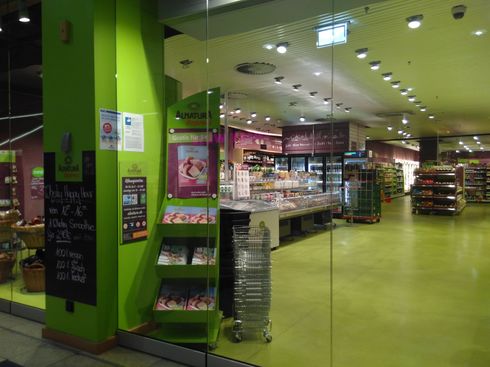
Your first option is a 100 percent organic supermarket near the Western entry of the mall: The nation-wide operating Alnatura chain is running one of the smaller Alnatura Express convenience stores for last minute provisions here. It can be reached easily from track 2 by a moving walkway. Downstairs turn right (facing away from the tracks), and there you'll easily spot the fresh-green coloured shop – a provider not only of all daily necessities, but also of fully organic snacks and coffee on the go.
For those who wish to refill their drinking bottle with tea or infusion, the "Tea(bag) of the week" comes at the unbeatable price of 1 EUR. The staff will happily fill your entire bottle with hot tea water if you ask nicely. Unfortunately opening hours on Sundays are limited to the afternoon.
When you find it closed do not despair: Next to it a Rossmann drugstore offers a good selection of organic dry goods, preserves, drinks and natural body care, though less than the DM branch mentioned below. If in a hurry you can buy the following brands without hesitation: "Alverde", "Sante", "Lavera", "Weleda" (toiletries), "EnerBio" and "Veganz" (food, the latter is entirely vegan). Since 2020 the range of environmentally friendlier household items has been on the rise: now you'll find the entire list of grandma's cleaning chemicals in the shelves, both citric and acetic acid as well as soda, beeswax food wraps and more, and in 2021 the company launched their own brand of environmentally certified range of cleaning products, "ecofreude".
The Eastern-most part of the mall (to the right when facing the tracks) houses a branch of the DM Drogeriemarkt
offering an abundance of certified organic dry goods, preserves, drinks, natural body care and eco-friendly household chemicals (see here for a detailed description), in short: everything you need while travelling except for fresh and frozen food.
Still in the East wing though more central you'll find a Vitalia wholefood market which in addition to dry goods, sweets and snacks, toiletries and detergents also sells fresh food: Here you can get organic bakery items and and sandwiches, fresh dairy products and a small selection of organic fresh fruit and veges. Prices here are more upmarket than at the DM branch, and you have to check for organic labels, too, though to a lesser extend. If in doubt the staff is more competent than the one in the drugstore superstores and they are two hours longer open on Sundays than the Alnatura.
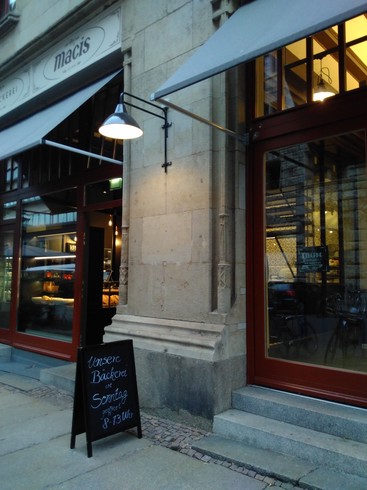
If in the mood for a good coffee a difficult question might bother the eco-conscious traveller: Should I have an organic coffee made by the coffee automat of the Alnatura snack bar or do I rather prefer a properly pressure-made yet conventional espresso in the beautiful bookshop cafe Ludwig on track level? I'd love to recommend the latter in this blog but organic ingredients are limited to organic syrup to flavour the coffee and iced tea of Coca Cola's organic brand "Honest". The coffee bar used to have organic apple spritzer but unfortunately no longer. With its beautiful ceiling the well-assorted bookstore however is worth visiting in its own right. While the book shop keeps open longer the cafe is closing at 6 pm.
City centre
If you have the time to take a stroll into the city centre, make sure to pay a visit to the bakery of the Macis restaurant a little south of the Thomaskirche yard with the famous Bach memorial, if only to marvel at the mouth-watering fully organic and skillfully decorated cakes and club sandwiches in the shop window. Unlike the organic convenience store next to it the bakery keeps open on Sunday mornings, and if you buy of their artisanal breads some organic butter is absolutely sufficient for a gorgeous picnic.
2024-01-05 13:30:00
[Leipzig, organic, vegan, gifts, snacks, lunch, supermarkets, grocery, trainstation, coffee, books, bakeries]
Link

Organic wholesale in the capital of Saxony (which is governed by a red-red-green coalition) used to be dominated by the local economy,
but since the oldest organic supermarket in town, Biosphäre, became part of the nation-wide Denn's chain in 2018, the picture has been resembling the one in other German metropolises: The market is devided between two local actors, a regional one and two of the nation-wide operating grocery chains, with a hand-full of smaller corner shops filling niches.
The largest density of organic supermarkets can naturally be found in the vibrant Wilhelminian style quarter of Neustadt north of the river Elbe with its – gentrification aside – still predominantly left-wing population of artists, students, activists, tourists, hipsters and bourgeois green-party voters.
Neustadt
It hasn't been always this way, but walking the old streets of Innere Neustadt with open eyes will present you with an abundance of shops and eateries boosting of vegetarian and vegan products. Many of them use organic produce, but won't advertise it – partially because they blend with conventional products, and use of organic ingredients will vary, partially in fear of being prejudged as expensive. Fortunately it is nowadays easier to find an organic supermarket in this neighbourhood
than a conventional one, so if you're tired of asking just walk to the next crossroad, and there you are.
The former Biosphäre markets are located here: the older one on Königsbrücker Landstraße opposite Schauburg theatre, and an even larger one in Alaunstraße a few metres from Albertplatz which replaced a conventional supermarket. Both have a self-service area where you can have coffee, cakes, pastry, sandwiches at any time of the day, and soups for lunch. Students are entitled a 10 percent discount on Wednesdays.
Recently the shop in Alaunstraße also took a small effort to support package-free shopping.
Berlin-based organic supermarket chain Bio Company has a branch a little south along the tramway tracks on Königsbrücker Landstraße. Just like the Denn's branches it closes at liberal 9 pm.
The Bio Company stores recently introduced fill-yourself stations with dry food and sweets. This shop offers more refill options that the one near Blaues Wunder bridge.
If you despair in face of the piles of plastics and paper wrappings you've been collecting while doing your regular shopping, re-use your glasses, containers and bags and refill them at Lose, a cosy zero-waste corner store in Böhmische Straße.
Altstadt
The Denn's Biomarkt chain not only took over the two former Biosphäre markets in the Neustadt but also opened a new supermarket within the Altmarktgalerie shopping mall.
Near
Bahnhof Mitte train station you'll find the main branch of VG Biomarkt, an organic co-operative which not only supports your zero-waste efforts but also sports its own organic fashion store.
Striesen, Blasewitz, Loschwitz, Johannstadt
The neighbourhoods along the river shore on the east side of town sport several branches of the zero-waste friendly VG Biomarkt food co-operative.
South of the Blaues Wunder bridge, local butcher's chain Vorwerk Podemus has one of its pleasant wholesale supermarkets.
First address for shortly travelled organic meat of animals which had a decent life. They also have branches in the neighbourhoods of Gruna, Neustadt, Alttolkewitz as well as a farmshop. While the Podemus shops do not offer food in gravity bins, they have been increasing their product range with jogurt, honey and jams in 250 ml deposit glasses lately. Make sure to return them in any organic supermarket.
Another option in the neighbourhood of Blasewitz is the second Bio Company branch in town. Just like in the Neustadt branch the bakery disk caters for the early bird from 7:30 am.
The only branch of a nation-wide operating organic grocery chain so far is Alnatura on tram hub Straßburger Platz which many locals still refer to by its old name from GDR times, "Fucikplatz".
Bühlau, Weißer Hirsch
To find fully organic groceries on top of the hillside North of the Blaues Wunder bridge, in the elegant residential area of Weißer Hirsch and adjacent Bühlau interestingly proves to be more difficult. What I found instead was the shop of a small-scale vegan manufacturer, Vegannett (a pun made of the words "vegan" and "nice", while the second part of the name also refers to the name of the owner-founder, Annett). On the premises of a former partially organic butcher's shop she prepares vegetable spreads which you can buy in many of the aforementioned supermarkets. But if you happen to be there on a Wednesday afternoon, pay a visit, taste and shop. In addition to the spreads you can also buy local honey. And the
best: Since 2022 the spreads have been coming in deposit glasses!
Klotzsche
If you fancy a stroll in the woods of Dresdner Heide or are on the way from or to the airport make sure to have sufficient time to visit the beautifully restored historical train station Klotzsche with its
Vorwerk Podemus supermarket and the organic station restaurant, both catering for the early bird.
Closed down
The following (partially) organic supermarkets do no longer exist although you will still find references to them on the web:
2024-01-05 12:00:00
[Dresden, Neustadt, organic, supermarkets, grocery, eatery, lunch, snacks, coffee, vegan, trainstation, farms, Elbe_cycle_route, Elberadweg]
Link

Monday, 27 November 2023
To find a place offering at least partially organic meals, snacks or coffee isn't a big deal in Salzburg, and places like the Bio-Burgermeister are frequent tourist destinations. But there's more than just healthy organic fast food –
from pleasantly modernized Austrian bars over cultured beer spots to slightly esoteric day cafes there's a broad range of places to choose from. What you shouldn't expect are authentic restaurants offering elaborated international cuisines, but that's probably not what you are here for anyway.
Burgers
When you're hungry and don't know where to go head for the Bio-Burgermeister in the middle of busy Linzergasse pedestrian street. With its liberal opening hours (no closing day, open until 10 pm) and central location this no-frills burger grill is serving both, meat, vegetarian, and vegan versions, purely made with organic ingredients. The service is swift, the burgers and side-dishes fresh, crisp and tasty, and most of the soft drinks and the beer are organic, too (though you have to check the bottles for organic labelling). The hot varieties I would describe as spicy rather than hot, and they come up with interesting seasonal versions like the pumpkin burger with a pumpkin patty. For meat patties you can choose between medium-done and medium-rare. The place serves neither desserts nor coffee.
Unfortunately it has implemented bad habits of conventional fast-food places, too: It produces a lot of waste since the meals are served on cardboard one-way plates, and the staff is neither busy cleaning the tables nor refilling paper towels.
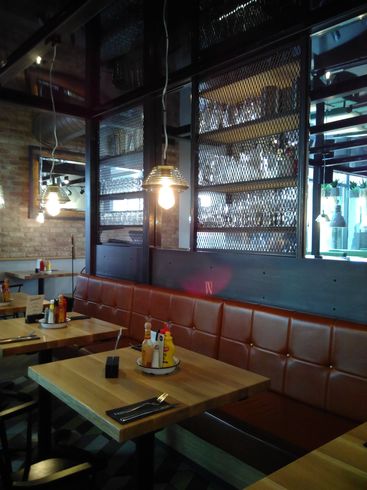
If the burgermeister is too crowded or you prefer to produce less waste a burger restaurant is just a few steps away: The Ludwig doesn't promise fully organic burgers, but organic patties made from organic beef, turkey or mushrooms, organic pulled pork and bacon.
In addition to burgers the place also serves salad bowls, desserts and breakfast (including organic eggs in a number of varieties). Among the drinks fruit juices and teas are organic.
Located in a pleasant backyard with a small fountain this cafe cum restaurant is also a much nicer place to spend time with friends or family – during the warm season on the spacious terrace, on rainy or cold days in the large urban-rustic dining room.
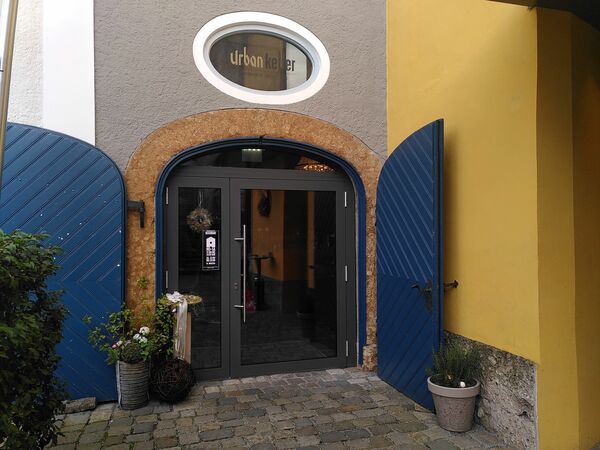
Austrian
The Urbankeller is not just a perfect address for a rustic meal accompanied by local organic beer, wine, juice or lemonade in the restaurant or a civilised drink at the adjacent bar. It also houses a stage for live acts – predominantly rock, jazz or experimental theatre, and the occasional crime play reading. Although the place is certified by Bio Austria not everything is organic. Fully organic dishes however are clearly marked with a green logo on the menu, and a good deal of the un-marked meat-based dishes (including nose-to-tail ones using offal) are served with organic meat (check for the "bio" keyword). Vegan and vegetarian options are also available. If you consider one of the typical Austrian flour-based desserts ("Mehlspeisen") make sure to come with sufficient appetite.
Schallmooser Hauptstraße where the Urbankeller is located changes its name to Linzergasse (or Linzer Gasse, the naming is not consistent) when it runs over into a pedestrian area towards the river Salzach. Amid its touristic jumble you'll find the Stadtkrug, a family-owned hotel and restaurant of old, with roots in the 14th century. The family runs an organic highland cattle farm north of Salzburg and serves the beef at the restaurant specialising in typical Austrian dishes. The farm has its own slaughterhouse on premise which allows the cattle to die as stress-free as possible within their known habitat. The chicken served in the Stadtkrug is also organic as are some hard cheeses and the ice-cream and other products made from sheep's milk. The breakfast at the hotel unfortunately is not organic.
Directly located on Linzergasse, almost down by the river, but nevertheless not a place that tourists will recognise at a first glance, the Innergebirg restaurant serves traditional Austrian mountain cuisine with local ingredients from the Pongau, the Pinzgau and the Salzburger Land areas. All the meat comes from the Rostatt organic farm (which also is a farm stay).
Note that the restaurant is closed on Sundays.
Another beergarden down in the old town is associated with the local brewery Die Weisse
specializing in weiss beer. They also brew one alcoholic and one non-alcoholic organic variety (watch out for the bio label) which nicely go together with a hearty Austrian meal – the beef here is
organic and you may ask the waiter for likely other organic ingredients. Of course there's indoor seating, too.
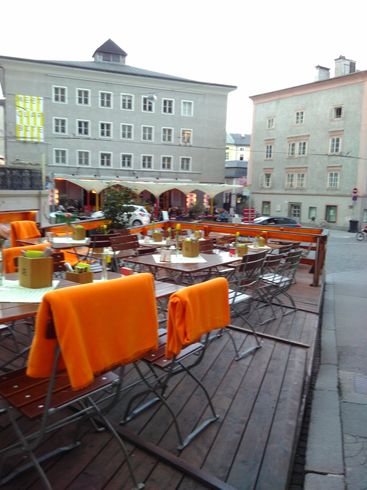
On the other side of the Salzach river September 2018 saw the opening of a new fully organic, predominantly biodynamic restaurant and bar opposite the museum of modern art inside the Mönchsberg cliff, the Humboldt, a pleasantly modernized version of an Austrian "Gaststube", with geometric dark-wooden interior, a light-and-steam installation serving as a fire place surrogate, green cushions, table-clothes made from felt, and a green-lighted bar. For lunch on weekdays you can choose between two set menus consisting of a soup or salad (your choice), and a vegetarian or omnivore main dish which come at 9 or 11 euros, respectively. In the evening the kitchen emphasizes on Austrian signature dishes like the Viennese Schnitzel (a delicate, crisp, yet melting dream), boiled filet ("Tafelspitz"), and pancakes ("Palatschinken") as dessert (which were quite unexceptional).
The menu clearly marks organic, biodynamic, vegan and vegetarian items and also lists the sources of all ingredients which usually are Austrian farms and producers, often located in the vicinity. In all drink classes organic options are available, and often you have no choice but to drink organic. The bar keeps open until late each day, making it the perfect place for an evening out, and there's outdoor seating, too.
Indian
Back in town, just a few steps from the Stadtkrug vegetarian fusion food with roots in the Indian cuisines has been served for almost 20 years at Spicy Spices. This pleasant eatery may not be the place for the romantic dinner but is a nice location for a chat with friends, accompanied by a healthy lunch, a coffee, chai and/or cake, all organic. You can also shop for their home-made spice mixtures, chutneys and pickles which make tasty gifts.
International
The second surviving organic restaurant of old also draws its inspiration from the subcontinent and East-Western fusion. The Heart of Joy is a vegetarian (vegan friendly), predominantly organic cafe cum eatery run by followers of Sri Shinmoy. The latter is openly presented which may not be your idea of the perfect surroundings for a recreational sip of coffee or an Italian, Austrian, oriental or Indian inspired lunch in this otherwise pleasant location. Students are entitled a ten percent discount, and breakfast on weekends is being served all day.
For a simple lunch or a piece of home-made organic cake you may also try the A* bar in nearby Auerspergstraße.
If you are near the main train station on a weekday during daytime the bistro Leichtsinn ("carelessness") is worth a try. You'll find it if you leave the train station in western direction via Südtiroler Platz and walk in southern direction along Rainerstraße parallel to the tracks until you reach Elisabethstraße.
Tea, beer, and cheese are always organic here, and
the owners promise to prefer organic and regional ingredients, but admit that some ingredients such as avocados definitely won't be organic. Unfortunately I did not get an answer to whether the meat and other products of animalic origin are organic, so better ask about them.
The menu changes daily, and you always have the choice between
a soup, one vegan, one vegetarian and one meat- or fish-based dish in addition to salads (mix your own from the salad bar), home-made foccachia sandwiches, wraps, quiches, and empanadas (the owner-chief originates from Ecuador). The place is great for
breakfast, there are home-made cakes (also vegan), shortbreads and fair-trade coffee, and if you need provisions for your travel, simply order to take away.
Fine dining restaurants in the 2020ies can be reasonably expected to work together with small-scale organic gardeners, bakers and/or butchers, but they often do this in the closet. So I found the
Genussprojekt at Ursulinenplatz, with a view on the river Salzach, but I am disappointed to report
that the only classified organic ingredients on their menu are fruit juices and beef.
Beef-lovers may give it a try and ask about the veges, the flour, and whether there are
natural wines, too. So far no first-hand review from me yet.
Italian
Arguably the city's best pizza can be had when entering a non-descript entrance on Franz-Josef-Straße south of Paris-Lodron-Straße: Here you find a place boringly dubbed Organic Pizza Salzburg, and this is exactly what it is: A totally unpretentious venue serving glorious 100% organic pizza in vegetarian, vegan and omnivore varieties, all well worth their 9.80 to 16.80 EUR. Instead of the standard base made from wheat you may order one made with spelt. Choose your drinks from the fridge (most, but not all organic), and have a home-made organic and vegan cake with fairly traded ingredients and/or a locally produced ice-cream to end your meal. No frills, just love, and in contrast to other fast food places covered here you will be served on real plates instead of paper waste. Unfortunately the place is closed on Mondays and Sundays.
Vegan
For Italian and decidedly vegan food (including pizza) you have to wait for the re-opening of
Vegitalian. This no-frills restaurant stepped in as the hotel restaurant of The Keep near Salzburg Hauptbahnhof train station between spring and autumn 2022 and is planning a re-opening in Nonntal. It's not 100% organic, but most ingredients come from regional and/or organic producers. No further review here (yet) since I haven't had the chance to visit.
Just a few steps from Organic Pizza Salzburg you'll find a novelty in the city: a crowd-founded vegan cafe. The
Gustav serves
breakfast, sandwiches, soups and salads as well as smoothies and cakes, everything predominantly organic. Unfortunately it is closed most days of the week, so check below to avoid a bad surprise.
For a vegan or vegetarian, partially organic lunch, dinner or weekend brunch the neighbourhood of Gneis was a pleasant destination before the Covid-19 pandemics. Then chef Julia and her happily carnivore dog announced a refurbishment of the The Green Garden, and I am still waiting to see a re-opening. The place consisted of two locations, a daily (except Mondays) open restaurant, and a cafe cum wine bar annex. There was no general commitment to organic certification, but Julia promised to use predominantly fresh seasonal Austrian ingredients as far as possible produced without chemically synthesized fertilizers and preservatives. The tea (including iced tea), most wines, some beers, eggs and goat cheese were certified organic. On the menu you were to find bowls, soups, salads, vegan burgers as well as pasta and vegetable versions of Austrian signature dishes like the schnitzel, but the place was great for breakfast and healthy snacks, too. During the nice season The Green Garden sold vegan organic ice-cream to both, guests and passers-by.
Coffee and cakes
For the real coffee thing head for Röstzimmer 15 a few meters from "Spicy Spices". A cosy living room serving artisanal (though not necessarily organically certified) chocolates and pastries with Ethiopian organic coffee roasted in the room next door where you also can have a small lunch.
An Italian-style coffee drink prepared with organic milk can also be had at Fabis Frozen Bioyogurt.
Fancy an organic coffee drink on the go, made with organic milk or plant-based drink, on your way from the old town before crossing the Mozartsteg pedestrian bridge over the river Salzach? Take your coffee mug and stop by what's arguably the city's tiniest coffee house,
We love coffee.
Unfortunately they do not have any eathenware and will serve their Italian-style coffee or flat whites in a paper cup. What a waste – since I did not have a cup at hand I cannot say anything about the quality.
When you take a stroll or bicycle tour along the river Salzach in southern direction (towards castle and zoo Hellbrunn) stop by the farm cafe of the Bienenlieb beekeepers. You may simply step by for a coffee break or a home-made organic soup with honey bread, but if you are planning to have breakfast on Saturday (from March through December) make sure to call upfront for reservation.
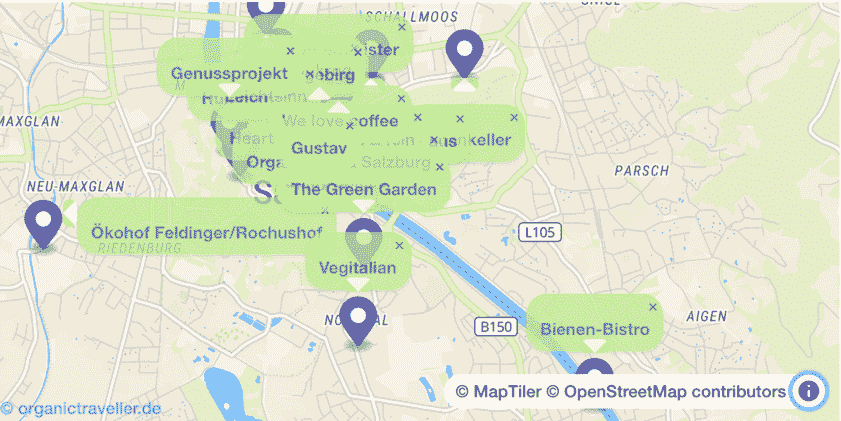
Temporarily closed
Closed or no longer organic
- Ährlich, Wolf-Dietrich-Str. 7
- Enoteca Settemila, Bergstr. 9
- Zum Hirschenwirt, St.-Julien-Str. 21-23 (no longer organic)
- Franziskischlössl, Stefan-Zweig-Weg
- klein & fein, Rupertgassei 9 (cafe and delicatessen)
- Kuchenfee, Paris-Lodron-Str. 19 (partially organic cafe)
- Ökohof Feldinger/Rochushof, Rochusgasse 6 (organic
supermarket and self-service restaurant)
- Rosencafé, Steingasse 4 (fully organic cafe cum gastro bar)
- Stadtimbiss, Franz-Josef-Str. 19 (successor is not organic)
- Schützenwirt, Dorf 96, St. Jakob am Thurn
2023-11-27 17:00:00
[Salzburg, organic, lunch, dinner, takeaway, restaurant, cafe, eatery, coffee, ice-cream, fastfood, vegetarian, vegan, Austrian, Indian, burgers, pizza, supermarkets, grocery, wine, beergarden]
Link

Saturday, 25 November 2023
For (re-)filling your kitchen cupboard and shop for un(pre)packaged food head straight to the northern shore of the Neckar river, to the Neuenheimer Markt market place. On Wednesday mornings (until 1 pm) a farmer's market is held here, but a few steps
away
you will also find the city's only package-free supermarket dubbed Annas Unverpacktes ("Anna's unwrapped goods") which with its outer wall made of turquoise tiles looks like a converted butcher's shop from the outside. As all zero waste convenience stores I've come across so far it's strictly vegetarian, but omnivores simply walk outside and turn left to find an artisanal butcher's shop at the next corner.
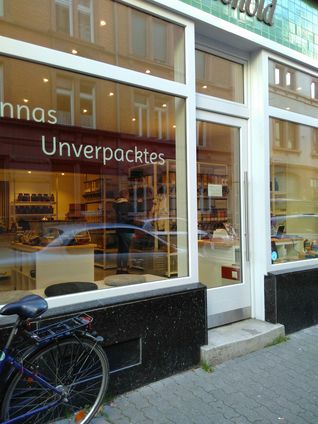
Until some years ago the Metzgerei Blatt was working according to the Neuland principles of animal welfare in meat production which are close to, but not fully organic, and in 2015 turned to fully organic principles. The shop was closed when I went there (as it's generally closed on Wednesday afternoons), but the owner assured me that the staff would fill my purchase into my own clean boxes as long as they were intended for personal consumation (instead of catering a bigger crowd). Ready-to-eat meat dishes are also available to take away.
Directly opposite the Neuenburger Markt there's also a shop of the local wholefood bakery Mahlzahn named after the dragon in Michael Ende's famous children's novel "Jim Button and Luke the Engine Driver". Here the shop assistants will happily put your bread, rolls, sweet and savoury pastries into the bags or containers you present.
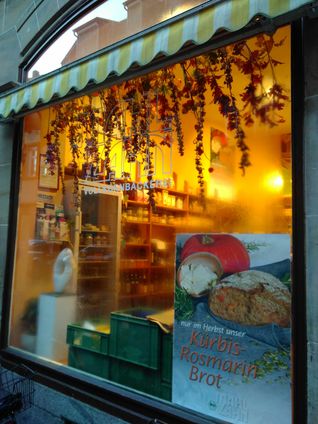
The bakery workshop itself is located in the Weststadt neighbourhood where you also can buy a small selection of loose-weight seasonal fruit and veges and assorted pre-packaged organic food items to supplement your breakfast, lunch or coffee table. When I went there in hope for an early organic breakfast it however turned out that this bakery doesn't follow the zeitgeist to serve coffee and snacks to eat on the spot everywhere -- no coffee machine here, no bar tables. (The rolls were delicious nevertheless.)
Mind you that this bakery does not use white flour at all.
Altogether there are four Mahlzahn shops, all with identical opening hours, the third one located in the neighbourhood of Rohrbach, and the fourth in Handschuhsheim (literally: "glove's home").
In general you will have difficulties to find organic bakeries not willing to fill customer-provided clean bags and boxes, and the new (in 2023) Zeit für Brot shop thankfully make no exception.
To buy all items for a zero waste breakfast at one stop head for the city's branch of the Denn's organic supermarket chain: The staff at its meat, dairy and bakery counters offers to fill cheese, cured meat products, sausages and bakery items into your containers. If you buy a coffee drink on the go in your own cup you'll receive a 30 cents discount, and you can also buy lunch to take away in your own jars instead of having it at the self-service bistro.
The other nationwide operating organic supermarket brand, Alnatura, operates three branches in town. They do not have a dedicated focus on zero waste, but there's a slowly increasing assortment of food in returnable glasses (e.g. mayonnaise, "canned" corn and other preserves, or vegetable spread) apart from unpackaged fruits, vegetables, and bakery produce. Unfortunately you must be familiar with the glass types to find them, and they are always among the most expensive options.
If you prefer independent shops the two Fair & Quer supermarkets in the neighbourhoods of Handschuhsheim and Wieblingen are worth a try.
Unfortunately I did not have the chance to visit them (as advised by my Mastodonbubble), so I cannot say whether their waste and package reduction measures exceed those of comparable dedicated organic supermarkets in Germany.
The shop in Wieblingen offers organic lunch Monday through Friday from noon to 2pm.
Student initiatives
I wasn't much surprised to hear from my Mastodon bubble about zero-waste and repair initiatives run by the university's students' parliament. Unfortunately I have not had the time to visit the campus, but I happily list them here: The self-service bike repair shop Urrmel and the package-free organic food co-operative Appel un' Ei. The latter is located between "Chez Pierre" and "Café Botanik" at the university's main refectory and is regularly offering lunch made with produce from a communal market garden.
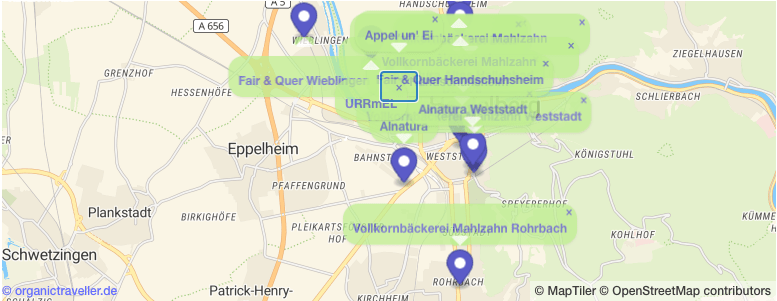
More to try
Here are a few more shops which I found during my research but didn't manage to visit myself:
Closed
You may still find references to the following organic grocery on the web, but be assured it's no longer there:
2023-11-25 22:30:00
[Heidelberg, organic, vegetarian, zero_waste, unverpackt, cafe, grocery, supermarkets, butcher, lunch, snacks, coffee, bodycare, household]
Link

Friday, 24 November 2023
Organic and fair is going mainstream, and you will have to go a long way to find a big food retailer not stocking at least some appropriately labelled items. As long as you avoid the cheapest textile retailers you will also be able to needle-pick organic cotton fig leaves covering up for otherwise not exactly fair, social and environmentally conscious behaviour in many fashion outlets.
So even if you happen to be stranded in darkest suburbia, you will be able to survive somehow. In the Munich metropolitan area however, you have the choice of leaving your money at retailers more conscious than average. Some of them are local chains, others have outlets or franchise takers everywhere in Germany and sometimes even abroad.
Food and necessities
There's a wide range of organic full retailers as well as smaller organic supermarkets, so chances are good that you will find one in your vicinity. Most malls however, with their exchangeable shops and brands, stick to conventional supermarkets, and – here's your choice – a smaller health-food store (Reformhaus), often of the Vitalia chain. Larger and newer branches even offer a coffee or snack bar. Although some stores are up to 80 percent organic, check for organic labels, as up to half of their goods on sale may be conventional.
The DM Drogeriemarkt drugstore chain is being managed according to anthroposophical principles in such a successful manner that new branches have been popping up in almost every newly or re-opened shopping complex during the past years. It has always had a focus on organic and eco-friendly products (alongside the conventional stuff) and is most certainly the reason for that its competitors Müller and Rossmann now also stock a wide range of organic dry food products, sweets and drinks, as well as natural cosmetics. While the big Müller branches stock an impressive selection of natural cosmetics brands and recently stepped in for DM as a reseller of the Alnatura food brand, DM has a broader focus, with a series of eco-friendly household items such as nappies, detergents, dishwasher tabs, or organic cotton pads of the "nature" own-brand alongside the own-brands "DM Bio" (food), and "Alverde" (cosmetics and toiletries). In addition DM branches sell a growing selection of reputable organic and eco cosmetics brands, such as "Weleda", "Lavera", "Sante", "I+M Berlin", "Dr. Bronner" (all products fully natural) or "Eos organic", "Dresdner Essence" and "Kneipp" (watch out for eco labels). Products of the "Alnavit" brand for nutrition and allergene avoiding food and sweets are usually organic, as are the own brand of the vegan supermarket chain Veganz. Since they kicked out Alnatura as their exclusive organic food brand a variety of products by various organic producers has been showing up in the shelves. For detergents stick to products of the "Ecover" and "You" brands. Also a word of warning towards the nature washing detergent: It's labelled with the Blue Angel environmental label, but nonetheless contains synthetic perfumes which accumulate in your clothes.
Thus said: Fresh food aside you will find everything you need for a daily eco-conscious lifestyle. It should however not go unnoticed that DM own brands comply with minimum standards for organic food and natural bodycare only. Food products complying with higher organic standards such as the biodynamic corn products by Alnatura were replaced when the chain rearranged their product selection. DM is said to treat its employees fairly, though this may of course vary with the branch management. And if you are not satisfied with a product (like I was with the washing liquid) or simply bought the wrong one they guarantee that you may return it in any chain store, opened or sealed, even without receipt. I did it, and it always worked like a charm.
If you for various reasons do not like dedicated organic supermarkets but find the search for sustainable and eco-friendly products in conventional supermarkets tedious pay a visit to the shops of the Fulda-based supermarket chain Tegut. The company took over the insolvent Basic supermarkets and converted most branches to predominantly conventional shops.
Lunch, snacks and coffee
The remaining branches of the Basic brand have a self-service coffee and lunch bar, but the entrance area of a supermarket might not be the place for a read or chat while having a coffee.
Munich also has a few branches of the coffee house franchise Black Bean serving exclusively organic coffee. Unfortunately only the coffee itself (and some soft drinks) are organic – no organic milk or pastries. However, since the Maxvorstand branch closed spring 2020 I am not aware of the status of the second branch in Schwabing. Black Bean branches offer free wifi.
Another Munich-based coffee chain franchise has been growing with new openings even during the covid pandemic: Coffee Fellows offer their coffee drinks both, in creamware, returnable Recup coffee cups.
The chai latte is fully organic as is all the milk and if you watch out for the "bio" label you will also be able to have an organic softdrink, unfortunately from one-way plastic bottles.
This chain has been expanding a lot recently and you will find them preferably in the vicinity of transportation hot spots like train stations, airports, fuel stations and shopping malls.
Interestingly one of the major bakery chains in Munich is an organic one: Hofpfisterei branches will usually sell you organic sandwiches (made of typically German sourdough bread) or pretzl with butter ("Butterbrezn" is not just a children's favourite), but on less frequented locations they may be outsold by early afternoon. In this case you can still buy organic spread (cheese or vegetarian) or sausages along with your breadrolls or opt for a sweet pastry. Most shops offer organic coffee-to-go, mineral water and softdrinks, and the bigger ones usually have a bar table or two. Both, the Hauptbahnhof and the Ostbahnhof train stations have a Hofpfisterei branch, although the latter one is closed on Sundays. An hour before closing Hofpfisterei offers a discount on breads, breadrolls and pastries, and many branches cater for the early bird, often opening at 7am.
For hearty Mexican fast food head for one of the Pureburrito branches.
Clothes
Both, the C&A and H&M fast fashion chains have been extending their range of products made from organic cotton, recycled and eco-friendlier materials in the past years. C&A shops label their sustainable collection clearly visible on the price tag (look out for small hearts and the "Bio Cotton" string), but the product range is restricted to basic items such as t-shirts and underwear, and apart from this unreliable. Kids and teens are better catered for than adults.
Since they are only randomly presented together you may find yourself fine-reading labels.
H&M covers a broader range of sustainable products – you will even find the occasional dress for women. But since most of them are made of mixed garments containing not biodegradable plastic fibres and there's no cradle-to-cradle concept they are just better than nothing. Products of the "H&M conscious" brand can be distinguished by their green tag. They are presented together in separate areas, both, within the women, kids, and men stores, and hence easy to find. According to Greenpeace both companies had been taking serious measures to reduce hazardous chemicals in the production process and to introduce fairer production during the 2010ies.
Closed
2023-11-24 22:00:00
[Munich, Schwabing, supermarkets, coffee, snacks, lunch, bakeries, grocery, fashion, bodycare, household, covid, corona]
Link










